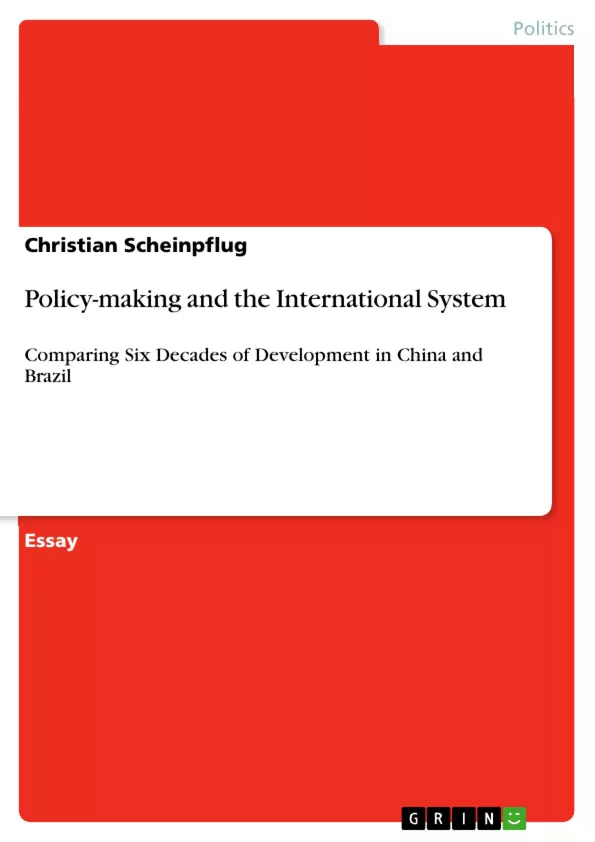China’s and Brazil’s economic development over the last 60 years has been remarkable and earned them the status of ‘rising powers’. Especially China’s transformation stands out as it increased its share of global GDP more than six fold from 1970 – 2009, to around 6%. Brazil’s share actually decreased slightly but still remains stable since 1995 at around 2.5% (Farooki and Mohan, 2013, p. 106, fig. 5.1). Notably, both countries increased their service sectors’ share of domestic GDP – China by 21%, Brazil by 23% - from 1980 to 2009, hinting at increasing sophistication (ibid, p. 108, table 5.1). This essay shows that these increases are results of structural changes in the global economic system and intentional action in both countries, which were initiated by international, national and non-governmental actors. Comparisons and contrasts are made to show how China and Brazil moved towards broader goals, such as governance, macroeconomics, and industrialization; as well as narrower ones, like decisions on aid and rural/urban development. Frameworks provided by development theories inform this attempt. The concluding section will summarize the main points and close with the argument that, although both countries’ trajectories diverged nationally, major international crises linked their ascendance.
Inhaltsverzeichnis (Table of Contents)
- Development Theories
- China's Ascendance
- The Great Leap Forward
- The Cultural Revolution
- Economic Integration
- Special Economic Zones (SEZ)
- Brazil's Ascendance
- Import Substitution Industrialization (ISI)
- The 'Washington Consensus'
- The 'Real Plan'
- The Impacts of China's and Brazil's Economic Development
- Conclusion
Zielsetzung und Themenschwerpunkte (Objectives and Key Themes)
This essay examines the economic development of China and Brazil over the past 60 years, exploring their transformation into “rising powers”. The essay analyzes the factors contributing to their ascendance, including structural changes in the global economic system, intentional actions by various actors, and the influence of different development theories. The essay compares and contrasts the paths taken by China and Brazil, highlighting their unique strategies and challenges. Key themes addressed in the essay include:- The role of development theories (structuralist, interventionist, people-centred) in understanding China and Brazil’s development trajectories.
- The impact of international crises, particularly the oil crisis of 1973, on both countries’ economic policies.
- The interplay between national and international actors in shaping development strategies.
- The influence of macroeconomic restructuring, industrialization, and urban/rural development policies.
- The implications of economic development for social inequalities and environmental sustainability.
Zusammenfassung der Kapitel (Chapter Summaries)
The essay begins by introducing the concept of "rising powers" and highlighting the remarkable economic growth of China and Brazil. It then provides an overview of relevant development theories, including structuralism, interventionism, and a people-centred approach. The following section focuses on China's ascendance, examining the country's initial reliance on a structuralist approach, characterized by state intervention and a focus on agriculture. The essay then describes the shift towards an interventionist approach during the 1970s, marked by economic integration, the establishment of Special Economic Zones, and the attraction of foreign investment. The essay then turns to Brazil's development, highlighting its reliance on natural resources and its early adoption of Keynesianism, leading to import substitution industrialization. The essay then examines the impact of the oil crisis on Brazil's economy, forcing a shift towards neoliberal policies and the adoption of the 'Washington Consensus'. Finally, the essay examines the impacts of China and Brazil's economic development on their respective societies and the global economy. It analyzes the multiplier effect of China's large population on global markets, especially in the case of soybean production, and the implications for both countries' rural populations.Schlüsselwörter (Keywords)
This essay focuses on the key concepts of development theory, economic growth, rising powers, structural change, interventionism, neoliberalism, international crises, foreign investment, industrialization, urban/rural development, and the impacts of economic development on social inequalities and environmental sustainability. It specifically examines the experiences of China and Brazil, contrasting their development trajectories and exploring the role of international and national actors in shaping their economic policies.Frequently Asked Questions
How did China's economic strategy evolve over the last 60 years?
China moved from a structuralist, state-led agricultural focus to an interventionist approach in the 1970s, establishing Special Economic Zones (SEZs) and integrating into the global economy.
What is Import Substitution Industrialization (ISI) in Brazil?
ISI was a strategy used by Brazil to reduce foreign dependency by producing industrial goods domestically, often supported by Keynesian economic policies.
How did the 1973 oil crisis impact these rising powers?
The crisis forced significant shifts: Brazil eventually adopted neoliberal policies under the 'Washington Consensus', while China accelerated its economic opening.
What are the key development theories mentioned?
The essay discusses structuralist, interventionist, and people-centred theories as frameworks to understand the trajectories of China and Brazil.
What were the social impacts of this rapid development?
While GDP grew significantly, challenges remained regarding social inequalities, environmental sustainability, and the balance between rural and urban development.
- Quote paper
- Christian Scheinpflug (Author), 2012, Policy-making and the International System, Munich, GRIN Verlag, https://www.grin.com/document/207421



